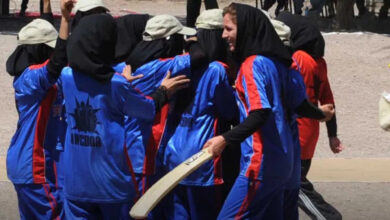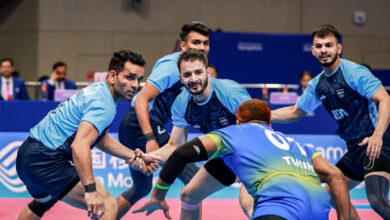Mihir Vasavda at Asian Games: How the strategy change in last game left India’s Ayhika and Sutirtha Mukherjee with a bittersweet bronze | Asian-games News

The Mukherjees weren’t sure whether to be happy or sad.Ayhika managed a smile. Sutirtha was fighting back tears. Ayhika was feeling ‘surreal’. Sutirtha felt ‘it could have been better’. They lost a thriller. But won a bronze. They were conflicted and confused. The kind of state they’d left their North Korean opponents in minutes before.
At 7-3 in Game 6, Cha Suyong took a step back from the table and scratched her head.
The North Koreans had been away for nearly three years before they suddenly emerged at the Asian Games. And Suyong looked perplexed, probably wondering if, during their years of self-imposed exile, the sport that’s all about the blurry, hypnotising rallies and mad scrambling had transformed into a slow-burning game of attrition, where chops and blocks were more decisive than the topspins and smashes.
For close to 50 minutes, Sutirtha Mukherjee and Ayhika Mukherjee tested their patience doing nothing but keeping the ball in play, putting it back on the table and forcing an error out of their opponents. For large parts, they were successful.
Until, in search of India’s first Asian Games final appearance, they shunned the strategy in the decider and with that, let the North Korean pair run away with a win in an anti-climatic end to a seven-game thriller of the women’s doubles semifinals.
The Indian duo lost 3-4 (11-7, 8-11, 11-7, 8-11, 9-11, 11-5, 2-11) to Cha Suyong and Pak Sugyong and settled for a bronze. But an Asian Games bronze in table tennis weighs as heavy as a gold in most other disciplines.
And yet, it could very nearly have been something bigger.
The Chinese, still reeling from the stunning defeat their world champion pair suffered at the hands of this unheralded Indian duo, threw their weight behind the North Koreans. But neither the partisanship of the crowd nor the fierce, attacking reputation of their opponents bothered the Indians.
Gold Medals, South Korea’s Jeon Jihee and Shin Yubin celebrate alongside silver medals, North Korea’s Cha Suyong and Pak Sugyong and bronze medals, India’s Sutirtha Mukherjee and Ayhika Mukerjee, and Japan’s Harimoto Miwa and Kihara Miyuu during a medal ceremony of the Women’s Doubles (REUTERS)
They were comfortable in their own skin, played on their terms and dictated the pace of the game, which bothered Cha-Pak – who lost the final to South Korea – from the first point.
Theirs was a simple tactic: keep the ball on the table, their returns kissing the net and offering no loop for Cha-Pak to work with. Like Tendulkar’s monkish restraint to leave the outside-off deliveries in Sydney once, the Indians showed unwavering discipline to avoid the flourishing shots.
Occasionally, Sutirtha would unleash her ferocious backhands but only when the ball was there to be hit, rather than forcing the issue. Ayhika did nothing fancy, sticking to the unglamorous – but effective nevertheless – blocks and slices.
Nothing illustrated this better than the fact that in the first game, Sutirtha-Ayhika hit just one winner; the remaining 10 points came from the errors they forced from Cha-Pak with their unrelenting style.
The North Koreans did not seem prepared for this slo-mo action and coordination, which has its roots in decades of friendship and consequent understanding of each other’s strengths and weaknesses.
“They have different rubbers,” national coach Mamata Prabhu said. “Suthirtha has long pimpled rubber on her forehand and plain on her backhand. Ayhika has pimpled rubber on the forehand and anti-spin on the backhand. It’s quite a difficult combination with four different rubbers for opponents.”
Ayhika’s backhand rubber, the Dr Neubauer Gorilla, has attracted particular attention for the disruption it’s caused in rallies completely negating the spin factor.
The slick-surfaced rubber – rare and uncommon according to experts – puzzled the Chinese pair in the quarterfinals as it blocked the topspin and helped Ayhika to keep the ball low after the bounce, thus making it harder to play a return with heavy topspin.
And it continued to confound the North Koreans, who were constantly searching for different ways to deal with it.
Ayhika saw Germany’s Petrissa Solja and decided to get it. “I have been playing with this rubber since childhood. My coach told me the anti-spin will suit my style,” she said. “Nowadays, we find these rubbers easily in the domestic circuit. But that wasn’t the case before.”
Prabhu said the different types of rubbers give them ‘so many variations, you cannot judge.’ Prabhu points to the title they won on the world tour earlier this year, months into their partnership. The Asian Games medal, she added, fuelled more hope.
Ayhika and Sutirtha, friends for 20 years, spoke after every point. Sometimes, Ayhika said, it was to discuss how to play the next point. On a few occasions, they veered onto topics off table tennis to relax their nerves.
The calm chop-and-block game kept Sutirtha and Ayhika in the hunt against Cha-Pak until the last game, when they decided to adopt an aggressive approach.
Ayhika, who struggled to land her forehand attacks on the table all afternoon, continued to hit long and so did Sutirtha, whose backhand suddenly lost its range.Most Read
1
Priyamani says ‘half the scenes in The Family Man were improvised’ Manoj Bajpayee, but Shah Rukh Khan sticks to the script
2
Bigg Boss Tamil 7: Here’s the l of contestant set to enter Kamal Haasan show
See More
The North Koreans, who were hitting into the net constantly, found their rhythm and landed a few painful blows. A stunning forehand, hit with dollops of topspin and one that went right in between the Mukherjees, eventually broke their resilience as the Indians, who went 4-0 down in the decider panicked.
“The North Koreans played a few shots really well and we were shocked,” Prabhu said. “When they lost a few points, they got under more pressure to win. There, they couldn’t find that rhythm.”
Eventually, the afternoon that began with a lot of promise ended timidly. Horic as it is, for the Mukherjees, this was a bittersweet bronze.







